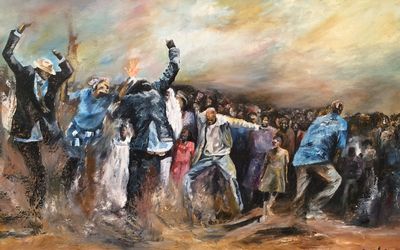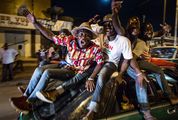HALF ART: Cape arts transcend SA’s contradictions
by Chris Thurman,
2015-12-11 05:50:24.0
IT IS easier to bash than to build. It’s much easier, for example, to point out the failings of a political party, a state department or a corporation than it is to get your hands dirty, actually trying to fix things. That, dear reader, is the columnist’s prerogative. Indeed, criticism is the most valuable use to which any media platform can be put, which is why "sunshine journalism" is viewed with such disdain by hardened journos.
Regular readers of this column will know that my potshots are aimed at targets across various ideological, geographical and arts-cultural spectra. For the most part, like the majority of my compatriots, I moan about the government. But last week, I ventured some critical comments about the Democratic Alliance (DA). These seem to have ruffled a few feathers — apparently white people are supposed to rant only about the African National Congress and the Economic Freedom Fighters.
So I was apprehensive about arriving in Cape Town this week. I’ve also done some bashing of Capetonians before, and feared that I might feel compelled to write again about, say, the city’s inability to escape apartheid economics and urban planning. Given that Cape Town and the DA are mutually metonymic to most people, this could seem like the beginnings of a vendetta.
Fortunately, however, I have instead been reminded (as I am each time I visit) that it is no more feasible to make generalisations about Cape Town than about any other South African city. It has its spaces of inclusion and exclusion; there are patches of cosmopolitan diversity and pockets of monotone sameness.
My own feeling — for what it’s worth — is that the DA in local government has indeed attempted to improve the material conditions in which poor and working-class residents live, and not just to maintain it as the playground of well-to-do denizens and tourists. That’s not to say it shouldn’t be taken to task for not doing more. But Cape Town’s problems and paradoxes are those of all South African cities writ large.
The vogue for reappraising Nelson Mandela was on my mind as I walked a few blocks northwest from the dubiously named Castle of Good Hope. I passed under the balcony of the City Hall from which Mandela delivered his first public speech after his release from prison. On the way to Adderley Street, I passed informal traders, low-budget shops, hustle, bustle — enough urban mess and chaos and energy to make a Joburger, and anyone from anywhere on our continent, feel at home.
Further on, I hit Mandela-Rhodes Place, which surely encapsulates everything hated by those who feel that Mandela "sold out", or that his name and legacy have been tainted by association with (or appropriation towards) less-than-revolutionary ends. A hotel and spa, some overpriced coffee shops, a handful of other tourist traps — all presided over by smiling, unthreatening, ubiquitous Madiba faces.
There is no single truth about Mandela, no simple story. The same can be said of Cape Town.
My destination was the AVA Gallery (35 Church Street), where Cape Town Salon, which the Association for Visual Arts hopes will become an end-of-year tradition, is on display until January 9.
The exhibition, like the city, insisted on surprising me. There were some familiar and even famous names represented, but the works that struck me were by artists I hadn’t encountered before.
Foremost among these was Bethuel Ramadi, whose impressionistic oil paintings depict vivid scenes in ambiguous moods, from colourful crowds (Embizani and Wedding Dance) to rural toil (Men at Work) and sparse industrial settings (Scrapyard).
Equally striking, in a different medium, were the quiet brilliance of the video sequences in Film Verse. In these short works, Afrikaans poems have been given an audiovisual complement — beautiful words acquiring new resonance through richly conceived animation, performances and editing. One cannot, after viewing and listening to this "verse", maintain a simplistic view of the debate about Afrikaans at Stellenbosch University.
Art complicates, and artists undermine "right" and "wrong", "progressive" and "conservative", "black" and "white" as adequate terms of reference.
• The Cape Town Salon exhibition is on display at the AVA Gallery, 35 Church Street, Cape Town until January 9

Bethuel Ramadi’s oil painting, Wedding Dance, is on show at the Cape Town Salon exhibition until January 9. Picture: AVA GALLERY
IT IS easier to bash than to build. It’s much easier, for example, to point out the failings of a political party, a state department or a corporation than it is to get your hands dirty, actually trying to fix things. That, dear reader, is the columnist’s prerogative. Indeed, criticism is the most valuable use to which any media platform can be put, which is why "sunshine journalism" is viewed with such disdain by hardened journos.
Regular readers of this column will know that my potshots are aimed at targets across various ideological, geographical and arts-cultural spectra. For the most part, like the majority of my compatriots, I moan about the government. But last week, I ventured some critical comments about the Democratic Alliance (DA). These seem to have ruffled a few feathers — apparently white people are supposed to rant only about the African National Congress and the Economic Freedom Fighters.
So I was apprehensive about arriving in Cape Town this week. I’ve also done some bashing of Capetonians before, and feared that I might feel compelled to write again about, say, the city’s inability to escape apartheid economics and urban planning. Given that Cape Town and the DA are mutually metonymic to most people, this could seem like the beginnings of a vendetta.
Fortunately, however, I have instead been reminded (as I am each time I visit) that it is no more feasible to make generalisations about Cape Town than about any other South African city. It has its spaces of inclusion and exclusion; there are patches of cosmopolitan diversity and pockets of monotone sameness.
My own feeling — for what it’s worth — is that the DA in local government has indeed attempted to improve the material conditions in which poor and working-class residents live, and not just to maintain it as the playground of well-to-do denizens and tourists. That’s not to say it shouldn’t be taken to task for not doing more. But Cape Town’s problems and paradoxes are those of all South African cities writ large.
The vogue for reappraising Nelson Mandela was on my mind as I walked a few blocks northwest from the dubiously named Castle of Good Hope. I passed under the balcony of the City Hall from which Mandela delivered his first public speech after his release from prison. On the way to Adderley Street, I passed informal traders, low-budget shops, hustle, bustle — enough urban mess and chaos and energy to make a Joburger, and anyone from anywhere on our continent, feel at home.
Further on, I hit Mandela-Rhodes Place, which surely encapsulates everything hated by those who feel that Mandela "sold out", or that his name and legacy have been tainted by association with (or appropriation towards) less-than-revolutionary ends. A hotel and spa, some overpriced coffee shops, a handful of other tourist traps — all presided over by smiling, unthreatening, ubiquitous Madiba faces.
There is no single truth about Mandela, no simple story. The same can be said of Cape Town.
My destination was the AVA Gallery (35 Church Street), where Cape Town Salon, which the Association for Visual Arts hopes will become an end-of-year tradition, is on display until January 9.
The exhibition, like the city, insisted on surprising me. There were some familiar and even famous names represented, but the works that struck me were by artists I hadn’t encountered before.
Foremost among these was Bethuel Ramadi, whose impressionistic oil paintings depict vivid scenes in ambiguous moods, from colourful crowds (Embizani and Wedding Dance) to rural toil (Men at Work) and sparse industrial settings (Scrapyard).
Equally striking, in a different medium, were the quiet brilliance of the video sequences in Film Verse. In these short works, Afrikaans poems have been given an audiovisual complement — beautiful words acquiring new resonance through richly conceived animation, performances and editing. One cannot, after viewing and listening to this "verse", maintain a simplistic view of the debate about Afrikaans at Stellenbosch University.
Art complicates, and artists undermine "right" and "wrong", "progressive" and "conservative", "black" and "white" as adequate terms of reference.
• The Cape Town Salon exhibition is on display at the AVA Gallery, 35 Church Street, Cape Town until January 9



















Change: -0.47%
Change: -0.57%
Change: -1.76%
Change: -0.34%
Change: 0.02%
Data supplied by Profile Data
Change: -1.49%
Change: 0.08%
Change: -0.47%
Change: 0.00%
Change: -0.04%
Data supplied by Profile Data
Change: -0.34%
Change: 0.03%
Change: -0.10%
Change: -0.22%
Change: -0.69%
Data supplied by Profile Data
Change: -0.28%
Change: -1.15%
Change: -0.07%
Change: -1.21%
Change: -0.22%
Data supplied by Profile Data